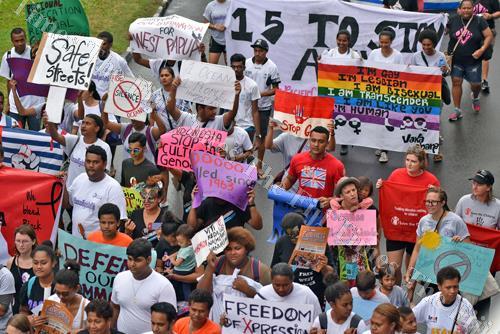The revelation by the Fijian Teachers Association about the growing number of children who are selling food on the streets instead of going to school is a concern.
FTA president Netani Druavesi believes the Education Ministry should conduct a survey to determine the economic impact of COVID-19 on families and how it was affecting parents’ ability to send children to school.
“We can see it for ourselves when we see children who are supposed to be in school, selling food or other products just to get money for their family’s survival,” said Mr Druavesi.
His concern comes in the wake of the revelation by the Prime Minister Voreqe Bainimarama that 115,000 people had been impacted by the pandemic.
They had either lost their jobs, or were being forced to work reduced hours. Mr Druavesi said most school heads in Fiji reported student attendance to the ministry every day.
He said a survey to determine how families were coping and why children were not returning to school post COVID-19 had not been done. There will be concern over this news.
Around the world, as businesses cop the brunt of the pandemic, we are left to mull over a future that is quite unsettling really.
Many businesses have shut down, many have filed for bankruptcy and many are on the verge of closure around the world. With the surge in COVID-19 cases globally, there is also a concerted effort to bring out a vaccine. This is where our hopes lie.
On Saturday, the Hindustan Times reported a parliamentary panel had informed the Indian government on Friday that a vaccine was expected only by early next year.
CNN reported more than 61,000 new cases of COVID-19 were recorded in the US on Saturday.
There were 685 virus-related deaths recorded. Interestingly the US Centers for Disease Control and Prevention stated about 40 per cent of people infected with COVID-19 showed no symptoms of the disease. They were asymptomatic. In total, the US, as of last night, had 3.2 million cases.
Closer to home, CNN reported the Australian state of Victoria had recorded 273 new cases by Saturday.
On Saturday, CNN reported, another 1071 people died from COVID-19 in Brazil, taking the country’s death toll to 71,469, the second highest in the world. On the home front, we are reminded that we have two choices.
We can either ignore advice and pretend that we are immune to the virus, or we can be proactive.
We can either adhere to social distancing rules, or rue our misfortune when a loved one is infected and struggles to regain control of their health. Through experience, our local cases all needed weeks to recover, not a few days.
COVID-19 is real. Wash your hands often with soap and water or use a hand sanitiser.
Cough or sneeze into your elbow or into a tissue and dispose this immediately.
Do not shake hands and do not hug others.
Do not touch your face when you are out in public. Let’s do the right thing.




